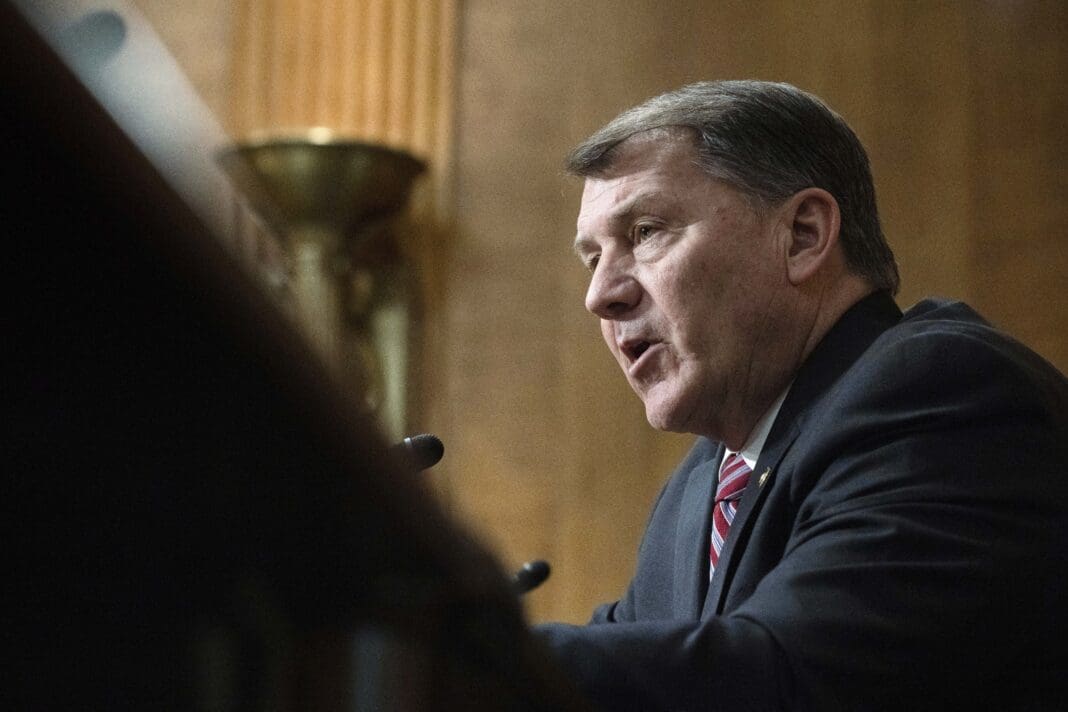Another GOP senator suggests ending guaranteed government funding of Social Security
Sen. Mike Rounds (R-SD) wants to end the automated funding of the safety net program so Congress can start ‘managing it.’

Sen. Mike Rounds of South Dakota on Sunday became the latest Republican lawmaker to propose making major changes to Social Security. Rounds’ comments come as others in his party are trying to convince the American public that the GOP does not want to upend or slash Medicare and Social Security.
On CNN, Rounds was asked whether he backs a proposal by Sen. Rick Scott (R-FL) to make every single federal law — including the Social Security, Medicare, Medicaid programs — expire automatically every five years.
Rounds did not answer the question directly, but did indicate that he too does not think Social Security should remain a mandatory spending program that is automatically funded without annual Congressional action:
I kind of look at Social Security the way I would at the Department of Defense and our defense spending. We’re never going to not fund defense, but at the same time we, every single year, we look at how we can make it better. And I think it’s about time that we start talking about Social Security and making it better. We’ve got 11 years before we actually see cuts start to happen to people that are on Social Security, and I think it’d be very responsible for us to do everything we can to make those funding programs now, and the plans right now, so that we don’t run out of money in Social Security and that it continues to provide all the benefits that it does today. Simply looking away from it and pretending like there’s no problem with Social Security is not an appropriate or responsible thing to do. So, I guess my preference would be, let’s start managing it.
The Social Security Act, enacted in 1935 by President Franklin Roosevelt, was intended to provide income for and curb dire poverty among older Americans. More than 53 million Americans aged 65 or older and 12 million people with disabilities currently receive income through the program. According to the Center for Budget and Policy Priorities, more than 16 million older adults would fall below the poverty line without those benefits.
John Witte, a tax policy expert at the University of Wisconsin–Madison and the grandson of Edwin Witte, the executive director of the committee that designed the Social Security program in the 1930s, told Madison, Wisconsin, ABC affiliate WKOW 27 News in September: “You’d have to re-fund it every year. That means there would be a battle every two years, at least, for funding the Social Security system, and it’d be under stress. And what I think it would do — I can’t imagine that would lead to increases in Social Security [funding.]”
During his State of the Union address on Feb. 7, President Joe Biden vowed to oppose cuts to Medicare and Social Security and accurately noted that some Republicans in Congress had been pushing to cut or sunset the programs. GOP lawmakers booed and heckled him, claiming that he was lying.
On Feb. 9, Senate Minority Leader Mitch McConnell backed Biden’s claim that Scott did indeed propose the unpopular idea of making the safety net programs expire twice every decade in his “Rescue America” package. He called Scott’s proposal a “bad idea” and said, “That’s not a Republican plan, that was the Rick Scott plan.”
Rounds joins a growing number of Republican lawmakers in both chambers who have endorsed cuts or changes to the programs, including South Carolina Sen. Lindsey Graham, Wisconsin Sen. Ron Johnson, and Georgia Rep. Buddy Carter.
In its fiscal year 2023 budget proposal last year, the Republican Study Committee, consisting of 172 right-wing House Republicans, proposed significant modifications to safety net programs, including increasing the age of eligibility for Medicare for people who have already paid in.
Rounds’ campaign website states: “Mike believes meaningful and appropriate reforms must take place, if the U.S. is to balance its budget. Current entitlement programs are not solvent and federal deficit spending already threatens our national economy. However, any reforms must also take into consideration current beneficiaries and the long-term economic impact.”
Published with permission of The American Independent Foundation.
Recommended

Biden calls for expanded child tax credit, taxes on wealthy in $7.2 trillion budget plan
President Joe Biden released his budget request for the upcoming fiscal year Monday, calling on Congress to stick to the spending agreement brokered last year and to revamp tax laws so that the “wealthy pay their fair share.”
By Jennifer Shutt, States Newsroom - March 11, 2024
December jobs report: Wages up, hiring steady as job market ends year strong
Friday’s jobs data showed a strong, resilient U.S. labor market with wages outpacing inflation — welcome news for Americans hoping to have more purchasing power in 2024.
By Casey Quinlan - January 05, 2024
Biden’s infrastructure law is boosting Nevada’s economy. Sam Brown opposed it.
The Nevada Republican U.S. Senate hopeful also spoke out against a rail project projected to create thousands of union jobs
By Jesse Valentine - November 15, 2023








































































